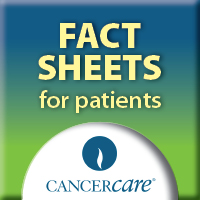This fact sheet reviews a number of resources available to patients coping with multiple myeloma, from the health care team to in the community.
Fact Sheets
Deep breathing and meditation can help cancer patients relieve stress. This fact sheet reviews a number of relaxation techniques that patients can use.
Hair loss during cancer treatment is distressing and may even change the patient’s sense of identity. This fact sheet addresses some common questions about hair loss.
Peripheral T-cell lymphoma (PTCL) is a rare and aggressive form of cancer. This fact sheet explains the condition to newly diagnosed patients and provides sources of support.
A diagnosis of soft-tissue sarcoma can leave many patients unsure of what to do next. This fact sheet provides more information about this type of cancer and lists sources of support.
Clinical trials bring about progress in cancer treatment, but patients may be nervous about participating in one. This fact sheet answers common questions about clinical trials.
It is essential to remember that you–the patient–are the most important member of your health care team. Use this fact sheet to learn about the different types of health care professionals who will help you during your journey with cancer.
Skin conditions like rash, itching and dryness are common side effects of cancer treatment. In this fact sheet, patients can learn how to keep skin problems like these under control.
Prostate cancer screening is important in the early detection of prostate cancer because many patients do not have symptoms. This guide reviews current screening tests, recommendations, and risk factors.
Many people see their cancer care as a collaboration. This fact sheet provides tips for patients with multiple myeloma for improving communication with providers during office visits.
